#possible worlds games
Text
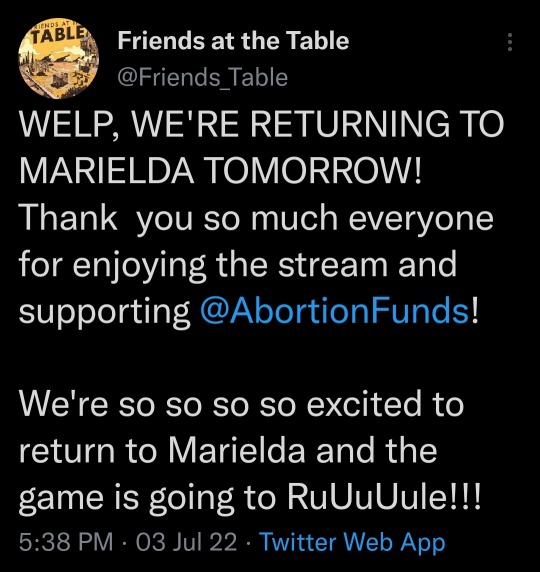




Friends at the Table @Friends_Table:
WELP, WE'RE RETURNING TO MARIELDA TOMORROW! Thank you so much everyone for enjoying the stream and supporting @AbortionFunds!
We're so so so so excited to return to Marielda and the game is going to RuUuUule!!!
5:38 PM PDT, Jul 3, 2022 (Source)
|
Friends at the Table @Friends_Table:
:3 :3 :3 :3 :3 :3 :3 :3 :3 :33
5:39 PM PDT, Jul 3, 2022 (Source)
|
Possible Worlds Games @possiblewgames:
HOLY SHIT
5:44 PM PDT, Jul 3, 2022 (Source)
|
Friends at the Table @Friends_Table:
the PERFECT game
5:49 PM PDT, Jul 3, 2022 (Source)
|
Possible Worlds Games @possiblewgames:
it would not EXIST without Marielda!!! it is 1/2 Marielda 1/2 Final Fantasy IX!!! that's the recipe!!!
6:09 PM PDT, Jul 3, 2022 (Source)
18 notes
·
View notes
Text

Doodle of a moment from watching @waroferas play albw
#a link between worlds#link#tloz#loz#the legend of Zelda#fanart#my art#albw link#love watching them play this game#funniest possible person to have play this game I think#we’re playing with a pink hair mod btw. which is why his hair is pink
1K notes
·
View notes
Text

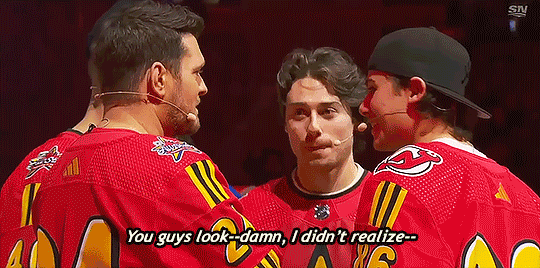
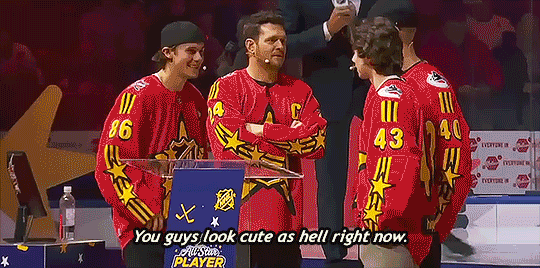
└ jack always hyping up the boys | all star weekend 2024 | 2.1.24
#jack hughes#quinn hughes#elias pettersson#vancouver canucks#new jersey devils#nhl all star game 2024#mine#the sportsnet video opens up a world more possibility#hockeyedit
645 notes
·
View notes
Text
I heart Until Dawn and it's collection of comically stupid characters. and I do mean all of them. and I do mean it affectionately. I just. god. the reason that anything can happen to these people At All is because, somehow, Every Single One Of Them decided that it was a good idea to accept an invite to the World's Most Suspicious Event at the World's Most Suspicious Place. "hmm!! I'm sure nothing strange or horrific is going to happen to us up on our rich friend's isolated mountain lodge; why would it?? I mean, sure, we Are going to be up there on the exact same date that we inadvertently triggered the events of his sisters' disappearance, but surely he's not upset with us about that or anything. let's go!!" seven separate people. nobody thought anything of it. it's incredible. impressive, even. I mean, I don't know. me personallyyyyy?? I probably would've received that invitation and thought, "oh, he's For Sure gonna do something to us up there, and he For Sure has the means to get away with it; I'm Not Gonna Go." but. hey. that's just me.
#like ofc there's the possibility that Josh is the best liar in the world#that he was able to keep his anger completely and totally choked down for a year#I imagine they didn't Talk Much during that year; I imagine that distance is conducive to conducting a good revenge plot#but jesus. the exactly anniversary?? and the exact location?? I need you guys to get it together for a sec.#how was NOBODIES first thought 'oh so he's gonna do first degree murder. that's what this is. obviously.'#like thank GOD he just decided to do a prank lmfao!!#until dawn#josh washington#emily davis#jessica riley#sam giddings#chris hartley#matt taylor#ashley brown#mike munroe#horror#video game#cloey talks games#mine
235 notes
·
View notes
Text
yeah, sorry, I can't come in to work today. yeah, I've got to think about how the tv adaptation of the last of us expertly made you comfortable with joel's violence through making you care about ellie enough it all feels justified so that by the time he gets to the hospital, you're genuinely conflicted about the carnage he enacts, some of which may not have been strictly necessary at the level of brutality he carries it out. yeah, it's gonna be all day
#the last of us#the last of us spoilers#tlou#tlou spoilers#joel miller#look#I just have a lot of feelings#and it's possible some people will look at this and be like#'no! it wasn't brutal! joel was protecting his babygirl!'#to which I would say#politely#you may have missed the central point that neil druckmann is always driving at in these games#which is: how much violence is okay in the service of love?#would you kill the world#would you kill any chance you have at having a fully trusting relationship with your child#just to keep them safe#also the way pedro played the whole thing....like sir what was going on in your head I must know!!!#idk if it was bc you're not playing joel#but it felt so much harsher than the game!#in a REALLY interesting way#full compliments to mr pascal#but like..........the clear eyed completely cold stone killer he turned into#the LACK of apparent fear and desperation#like.....what would ellie DO if she saw THAT guy! esp now post david#and the fact that that is the same man who was so careful with her#trying to draw laughs out of her and getting her attention without touching her#bc he knows she's still scared after david#and then the creeping realization that the thing he wanted to save in saving ellie#this burgeoning relationship with this daughter#is already unable to grow from the same place
931 notes
·
View notes
Text
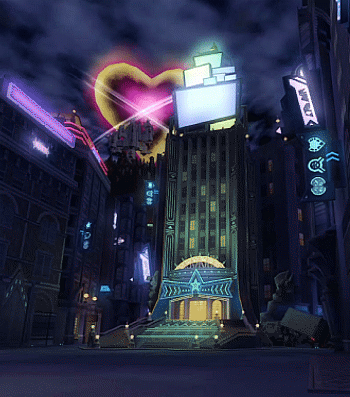
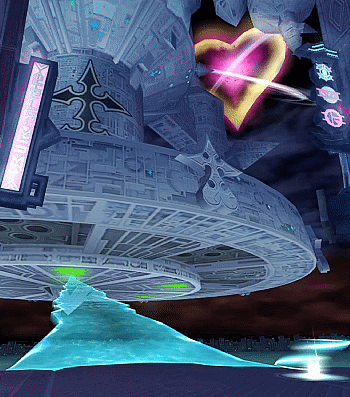

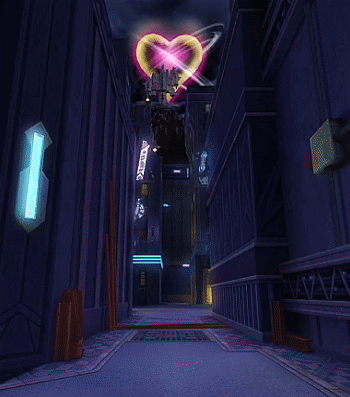
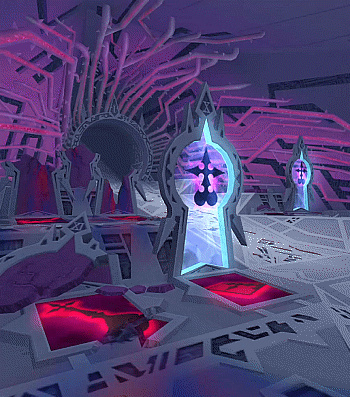
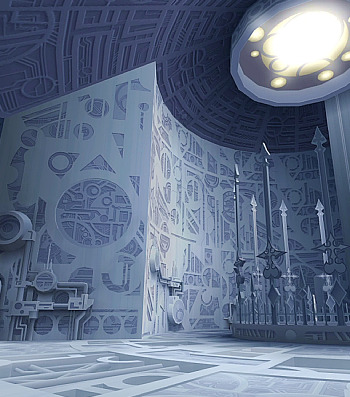
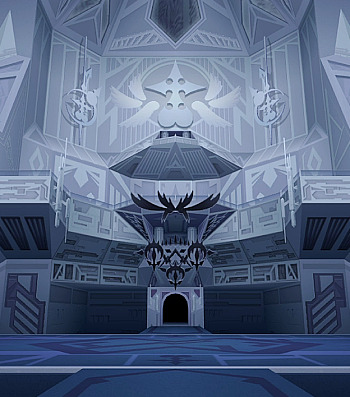
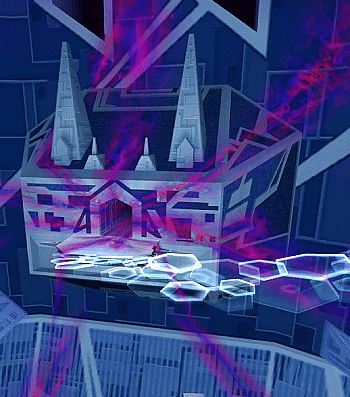
Kingdom Hearts 2 - The World That Never Was
#kingdom hearts 2#kh2#the world that never was#my gif#scenery#<- new tag :] check it out to view all of my gifs that showcase kh worlds#OKAY finally done giffing every world in this game#these take a lot of time and effort but it's worth it i think! they're fun to browse through#this world was really difficult because even though it has an amazing aesthetic a lot of these rooms are basically just hallways#BUT#the sheer scope of these rooms is VERY impressive#what i mean is if you're able to pull the camera out or take a moment to look out the windows you'll see just how much of#the castle and surrounding environment you can see. seriously it's huge and there's a lot you might have never known was there#unfortunately though it was not possible for me to capture a whole lot of that because the in game first person camera can only do so much
477 notes
·
View notes
Text
Yet again I'm thinking about the eradication of culture within the THG universe,, I have very complex opinions on culture wars within Panem and if they would exist at all in certain cases but like. Do you think they still speak Spanish in Ten? Do you think trans people can still change their names and wear what they please as long as they meet their daily quotas? Do families with religious ancestors remember to observe their holy days, even if it's in private, or was the eradication of religion in Panem so concrete that they don't remember anything at all? Much to think about
#even though THG isn't centred around its world as much as its politics (and for good reason!) i still find it fascinating to think abt#i have a LOT of thoughts about being trans in panem. specifically being trans as a victor#we know (or its implied mostly by ballad) that being queer isn't criminalised and katniss tells us people can marry who they like#but i can definitely see transness being an issue specifically for district people in the eyes of the capitol#obviously the class divide the districts represent would eradicate any possible trans healthcare#but i can see being trans as something the capitol would celebrate as unique and. almost fashionable?#so district people who have no trans medicare or even knowledge would be naturally skeptical of this 'capitol' thing#<- basically by making it a capitol thing it ellimates the rebellion present in the concept of being trans and keeps poorer ppl in line#just. something something removing everything a community could coalesce around by normalising some things and eradicating others#thg#the hunger games#thg series
83 notes
·
View notes
Text
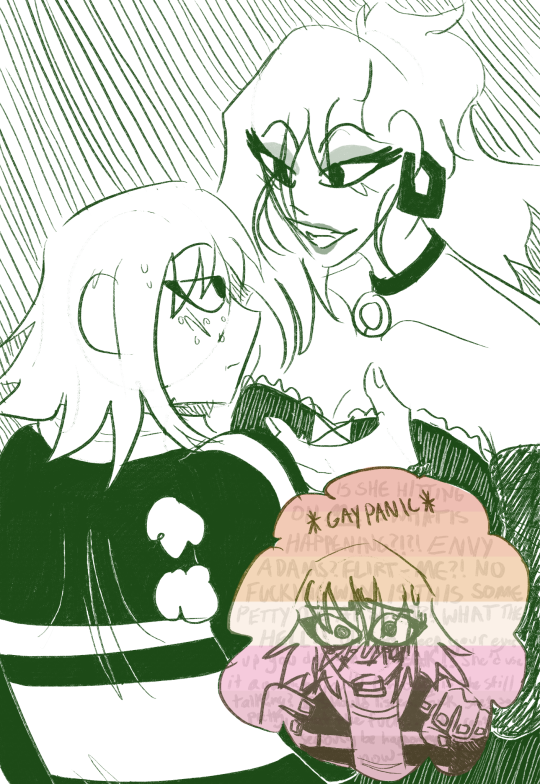
good morning gay people is this anything
#spto#sp comic#spvtw#fanart#kim pine#envy adams#ship stuff#kimenvy#envykim#envim#kimvy#(i have such a headache idk if i can think up any other possibilities here)#art#scott pilgrim comic#scott pilgrim takes off#scott pilgrim versus the world#scott pilgrim versus the world the game#spvtwtg#sketch#i either got a headache from the position i was drawing this in or just gay overload working on it and ya know what. fair if so.#i need to go sit in the dark for a while dhfodhjdr and/or eat something
113 notes
·
View notes
Text
When I see Pav's design I see a guy who really does not care about his rank or appearances (other than the boots rant towards Levi, but I personally like to think that's him showing some amount of concern towards a younger soldier, or to annoy him like the other character exclusive interactions in an attempt to distance himself from your party). Pav's shirt and coat are unbottoned down to the point where they don't even look like they fit him, his chest and and his bullet scars are exposed, he has unkempt hair, and seemingly has a very casual/sloppy posture which implies a lack of respect for the army he's supposedly been indoctrinated in. This contrasts with the image of how most soldiers are expected to be disciplined - to be orderly, clean cut, and tidy, especially higher ranking ones when displaying rank/status. Overall, Pav comes off as messy and possibly not even in his right mind from the beginning. When considering his true purpose for being in Prehevil is to kill the Kaiser, He's practically on a suicide mission.
And this can be further backed up by his attitude towards failing to kill the Kaiser, being saved, and taken to the train. What was the point of joining the same army that killed your village, rising up the ranks through whatever horrible means you had to go through and very possibly willing to do onto others what was done to you in order to get close enough to the man that you deam responsible for everything that has gone wrong in the world, only to find out that he was a indestructible monster beyond your powers? After that, it's either start from square one again, wait to die, or live your life on the run from everyone. Pav had kept a facade for possibly most of his life up until that moment, but as soon as he's cut down the mask breaks apart and he breaks down in train mad at you for giving him a few more moments of life.
To summarize, I'm intrigued by Pav's portrait because it gives us that hint on what kind for person he really is underneath the Bremen "disguise". He can't wait tear the damn thing off himself.
Is he a Bremen pig? Probably not. Is he still a pig? Yes. Or... rather something more feral hiding in the styes that he's trapped himself in, waiting to start a rampage in until he's put down himself. (Hmm. I wonder if that's would actually be a good Moonscorched idea?)
#Pavel Yudin#pav fear and hunger#Fear and Hunger#fear and hunger termina#Fear and Hunger 2#spoilers#fear and hunger spoilers#It took me a while as I was typing this that I realized he kind of reminds me of Char.#I've barely watched Gundam tho so pls do not @ me unless the comparison is accurate enough...#My only concern is that because his design is based off of World War II uniforms it's hard not to associate Bremen it with na/zis#- even though the developer stated that they were intentionally avoiding that...#any way i'm most interested in him possibly having more dialog with Levi or Karin since they (ironically) have somethings in common with Pa#and August since Pav's agenda is very similar to Ragnvaldr's in the 1st game.
65 notes
·
View notes
Text
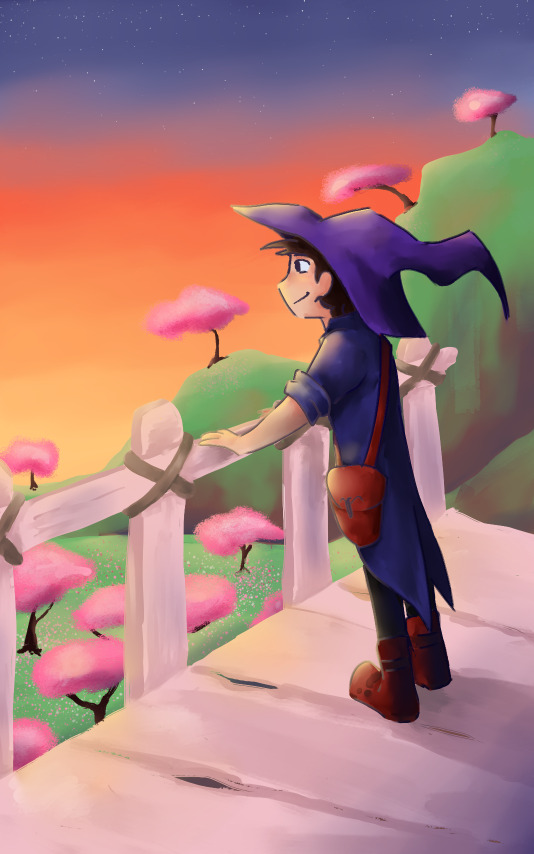
I started a sketch when I watched the first episode of his minecraft series and decided to finish it. I love the cherry biome, and his house and little bridge is really cute, so I figured it was a good excuse to practice backgrounds and also having people in scenes.
#rtgame#rtumblr#rtgamecrowd#rtgame fanart#my art#minecraft#its crazy how happy i am that he's just playing minecraft#like he's not rushing to get the best armor or banking on a villager hall#he's just exploring#and it's AWESOME#I love how obsessed he is with mapping everything#and his house is adorable#he gives off the vibes that he's some young apprentice wizard deciding to map out and explore the new world#It's so refreshing to see someone play minecraft like an exploration game and not a mission to get everything as quick as possible#He took time to read the end poem#daniel rtgame
67 notes
·
View notes
Text

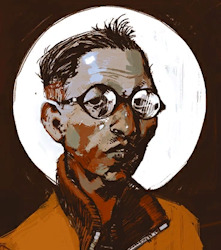

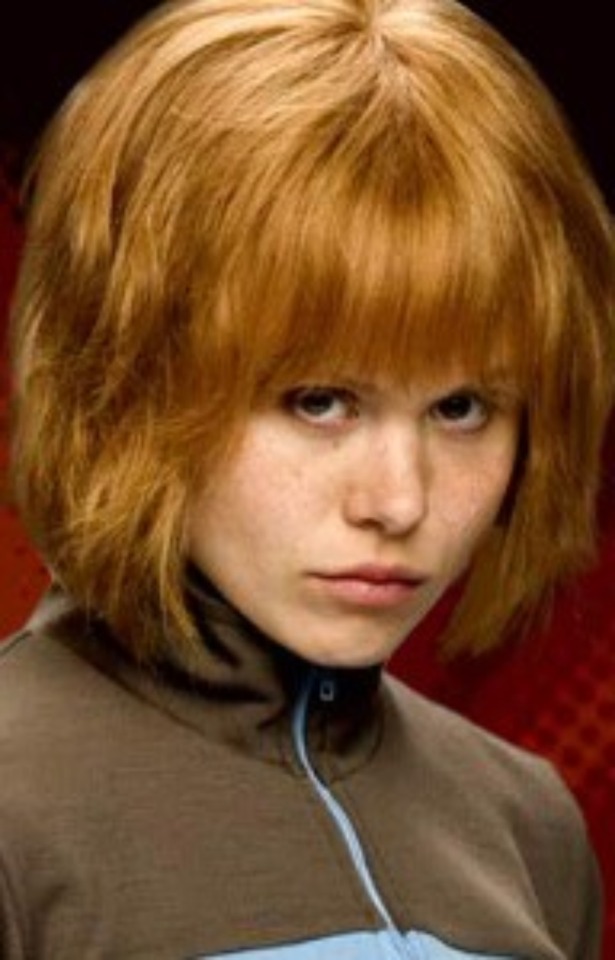


#best character named x#poll#poll game#kim wexler#kim kitsuragi#kim possible#kim pine#kimberly levaco#kimiko miyashiro#better call saul#bcs#disco elysium#scott pilgram vs the world#kimberly akimbo#the boys
74 notes
·
View notes
Text
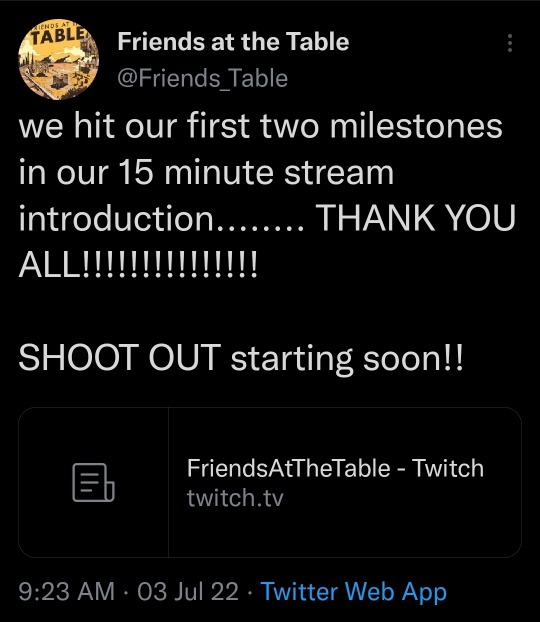




Friends at the Table @Friends_Table:
we hit our first two milestones in our 15 minute stream introduction........ THANK YOU ALL!!!!!!!!!!!!!!! SHOOT OUT starting soon!!
twitch.tv/friendsatthetable
9:23 AM PDT, Jul 3, 2022 (Source)
|
Friends at the Table @Friends_Table:
And you can find more info about Shoot Out here~~~
9:24 AM PDT, Jul 3, 2022 (Source)
|
Jack de Quidt @notquitereal:
dear podcast the name of the game is standoff but
9:32 AM PDT, Jul 3, 2022 (Source)
|
Friends at the Table @Friends_Table:
it is isn't it. isnt it
9:34 AM PDT, Jul 3, 2022 (Source)
|
Possible Worlds Games @possiblewgames:
@WCgameco just excerpted the game from the collection for PWYW if folks are interested in checking it out!!
9:48 AM PDT, Jul 3, 2022 (Source)
#friends at the table#jack de quidt#possible worlds games#world champ game co#standoff#wish you were here
5 notes
·
View notes
Text
do you guys have any wii or gamecube games you’d recommend? (or older nintendo too!!) I have a wii with emulators but i’m out of ideas on what to put on there. I like any genre :D
#there’s no possible “bad” recommendation ‚ idk if this sets the bar but like I’ve been wanting to check out the mysims games literally just#because a mysims fan blog was in my reccs and there’s so much stellar art and like chronicling of the NPCs’ backstories… cool as fuck#i didn’t mention what’s already on there because I really love getting to read people get INTO their fav things and I didn’t want to#stop anyone from infodumping about like sam & max just because I tell you I already have save the world + beyond time and space on there
69 notes
·
View notes
Text
i've shared some of Alex Freed's narrative writing advice before and i recently read another article on his website that i really liked. particularly in branching/choice-based games, a lot of people often bring up the idea of the author "punishing" the player for certain choices. i agree that this is a thing that happens, but i disagree that it's always a bad thing. i think Freed makes a good case for it here.
...acting as the player’s judge (and jury, and executioner) is in some respects the primary job of a game’s developers. Moreover, surely all art emerges from the artist’s own experiences and worldview to convey a particular set of ideas. How does all that square with avoiding being judgmental?
[...]
Let’s first dispel–briefly–the idea that any game can avoid espousing a particular worldview or moral philosophy. Say we’re developing an open world action-adventure game set in a modern-day city. The player is able to engage any non-player character in combat at any time, and now we’re forced to determine what should occur if the player kills a civilian somewhere isolated and out of sight.
Most games either:
allow this heinous act and let the player character depart without further consequence, relying on the player’s own conscience to determine the morality of the situation.
immediately send police officers after the player character, despite the lack of any in-world way for the police to be aware of the crime.
But of course neither of these results is in any way realistic. The problems in the latter example are obvious, but no less substantial than in the former case where one must wonder:
Why don’t the police investigate the murder at a later date and track down the player then?
Why doesn’t the neighborhood change, knowing there’s a vicious murderer around who’s never been caught? Why aren’t there candlelight vigils and impromptu memorials?
Why doesn’t the victim’s son grow up to become Batman?
We construct our game worlds in a way that suits the genre and moral dimensions of the story we want to tell. There’s no right answer here, but the consequences we build into a game are inherently a judgment on the player’s actions. Attempting to simulate “reality” will always fail–we must instead build a caricature of truth that suggests a broader, more realized world. Declaring “in a modern city, murderous predators can escape any and all consequences” is as bold a statement on civilization and humanity as deciding “in the long run, vengeance and justice will always be served up by the victims of crime (metaphorically by means of a bat-costumed hero).”
Knowing that, what’s the world we want to build? What are the themes and moral compass points we use to align our game?
This is a relatively easy task when working with a licensed intellectual property. In Star Trek, we know that creativity, diplomacy, and compassion are privileged above all else, and that greed and prejudice always lead to a bad end. A Star Trek story in which the protagonist freely lies, cheats, and steals without any comeuppance probably stopped being a Star Trek story somewhere along the line. Game of Thrones, on the other hand, takes a more laissez-faire approach to personal morality while emphasizing the large-scale harm done by men and women who strive for power. (No one comes away from watching Game of Thrones believing that the titular “game” is a reasonable way to run a country.)
These core ideals should affect more than your game’s storytelling–they should dovetail with your gameplay loops and systems, as well. A Star Trek farming simulator might be a fun game, but using the franchise’s key ideals to guide narrative and mechanical choices probably won’t be useful. (“Maybe we reward the player for reaching an accord with the corn?”)
Know what principles drive your game world. You’re going to need that knowledge for everything that’s coming.
[...]
Teaching the player the thematic basics of your world shouldn’t be overly difficult–low-stakes choices, examples of your world and character arcs in a microcosm, gentle words of wisdom, obviously bad advice, and so forth can all help guide the player’s expectations. You can introduce theme in a game the way you would in any medium, so we won’t dwell on that here.
You can, of course, spend a great deal of time exploring the nuances of the moral philosophy of your game world across the course of the whole game. You’ll probably want to. So why is it so important to give the player the right idea from the start?
Because you need the player to buy into the kind of story that you’re telling. To some degree, this is true even in traditional, linear narratives: if I walk into a theater expecting the romcom stylings of The Taming of the Shrew and get Romeo and Juliet instead, I’m not going to be delighted by having my expectations subverted; I’m just going to be irritated.
When you give a player a measure of control over the narrative, the player’s expectations for a certain type of story become even stronger. We’ll discuss this more in the next two points, but don’t allow your player to shoot first and ask questions later in the aforementioned Star Trek game while naively expecting the story to applaud her rogue-ish cowboy ways. Interactive narrative is a collaborative process, and the player needs to be able to make an informed decision when she chooses to drive the story in a given direction. This is the pact between player and developer: “You show me how your world works, and I’ll invest myself in it to the best of my understanding.”
[...]
In order to determine the results of any given choice, you (that is, the game you’ve designed) must judge the actor according to the dictates (intended or implicit) of the game world and story. If you’re building a game inspired by 1940s comic book Crime Does Not Pay, then in your game world, crime should probably not pay.
But if you’ve set the player’s expectations correctly and made all paths narratively satisfying, then there can be no bad choices on the part of the player–only bad choices on the part of the player character which the player has decided to explore. The player is no more complicit in the (nonexistent) crimes of the player character than an author is complicit in the crimes of her characters. Therefore, there is no reason to attempt to punish or shame the player for “bad” decisions–the player made those decisions to explore the consequences with you, the designer. (Punishing the player character is just dandy, so long as it’s an engaging experience.)
[...]
It’s okay to explore difficult themes without offering up a “correct” answer. It’s okay to let players try out deeds and consequences and decide for themselves what it all means. But don’t forget that the game is rigged. [...]
Intentionally or not, a game judges and a game teaches. It shows, through a multiplicity of possibilities, what might happen if the player does X or Y, and the player learns the unseen rules that underlie your world. Embracing the didactic elements of your work doesn’t mean slapping the player’s wrist every time she’s wrong–it means building a game where the player can play and learn and experiment within the boundaries of the lesson.
#every choice you make while designing your game says something about your experiences and your world view#whether you think it does or not#i think abt that interview with hozier where he talks abt all art being political & someone in the comments tried to disagree#by saying a child's drawing of their house cant possibly be political & someone else replies:#but it is. what does a house look like to them? is it one story or two? is it a trailer? an apartment? these things imply something#about that child's lived experience#another post i reblogged on kithj that talked abt these games like the forest or far cry where you play as a random white guy#that is being hunted by the evil native people. and the game requires you to just indiscriminately kill them#without thinking about it bc it's a game and you're the protag. that says something whether it was intentional or not#allowing the player character to do or say certain things without consequences communicates something to the player!!!#this does not mean you should punish them but that you should think about your narrative design and your choices and their outcomes#think about what makes sense in your world#and think about what it could imply in the real world. to the player#and think about all the different paths you can explore with them in this way#writing
70 notes
·
View notes
Note
how do you think this power imbalance is going to be solved, if you think it will be at all?
my personal theorized ending to deltarune is that we will sever the connection between the light world and dark world, freeing the darkners from being controlled by the light - after all, the same thing happens one level up, right? our connection to kris is going to be severed, freeing them from "reality's" control. all of the realms get separated from each other. it's sad for everyone to have to say goodbye, but the current system needs to be torn down.
you've got the spirit, but i don't exactly agree with the mechanics. i feel the lightners will have to give up their power — and to do so, they've got to walk away from the light world once and for all in one way or another. i don't think the light world can really exist past the end of the game, as deltarune is primarily about showing that it exists as an oppressive force in the world. it's a classic omelas-type situation, you know? the light world can't last forever when it's built on the oppression of another. the pain of the darkners is integral to what it is.
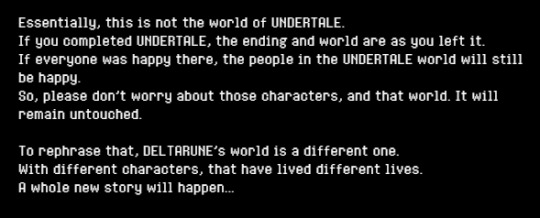
the light world represents a lot of pretty awful things in the world of deltarune, and i've talked a bit about that on this blog already. and the suffocating nature of nostalgia is another big one i want to bring up here – for both us and the characters within. for us, it's a big warped symbol of our memories of undertale. not only is it stylistically similar, but it's also a facsimile of a post-pacifist route undertale (complete with that early 2000's small-town air – it's even got a riverdale-esque diner) populated by familiar characters. a lot of our possessing kris has to do with our morbid curiosity over the characters we knew and loved – to the detriment of kris.
but it's not just us stuck in nostalgia's trap. so too are the characters – the light world consistently comes to symbolize an idealized version of the supposed "good old days" to our cast, both lightners and darkners alike – though the light world characters tend to mention "remember when–?" far more often. even ralsei, our darkner guide, is constantly reminding us of the prophecy to close those dark worlds and get back to the light world (and remember to take a break whenever you want, and don't feel you need to talk to everyone all at once, and;), even when he wants them to stay, all wrapped up in a familiar asriel-shaped package. it's no coincidence that the character most preoccupied with the lightner's fates to return to the light world is meant to remind us of our fondest memories of undertale.
but how good really are those "good old days"? the darkners were (and are) objects with no free will, hometown is a miserable place with cruel people, and undertale itself isn't all "good old days" either. the light world represents the way things are "supposed to be"– a truman-show town that looks much like undertale in interface and in population – but is "supposed to be" really a good thing? will we hang on to that fragment of a memory forever simply so that we don't have to let go of familiarity and suburban "normalcy"? or will we be able to leave that familiar world behind once and for all?
#ooc#deltarune#i feel very strongly about this one so i hope i explained it well!#it's hard to put this into words bc. it's one of those thing you should just play the game and see for yourself#but that memory of undertale permeates so much of the ways the darkners are stifled. see: the neo body#and i feel like it's not quite right to assume the lightners and darkners can't stay together when their equality is an important thing to#strive for. a world where they can be equals is possible even though we need to leave the picture
52 notes
·
View notes
Text
Can you imagine how funny long-running feuds among the Idols must be across the ages, though. Every time the person you’re arguing with passes on into another body you just have to stand there tapping your foot impatiently and wait a couple of years for the last three thousand years of interpersonal slights and drama to load in for them so you finally can go “AND ANOTHER THING — ” without being met only with a blank stare
#stray gods#the world building in this game is delightful honestly it makes for so many interesting possibilities#partially by being so willing to answer questions with '*shrug* no one fucking knows we're doing the best we can with the little we do know#and partially by having little things like this. how do you keep a fight going for thousands of years with these little breaks.#well they do. they sure do#gaider has done such a wonderful job with leaving space for weirdness and possibility here. no easy answers and I love it
93 notes
·
View notes